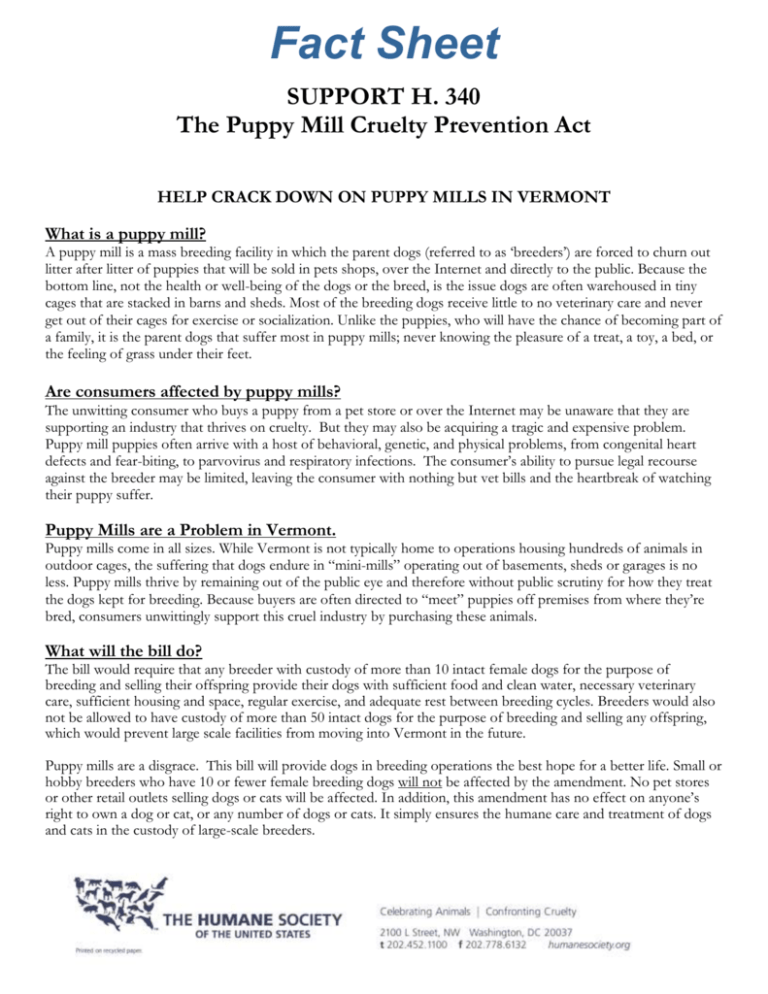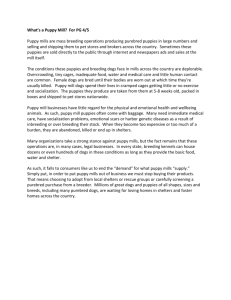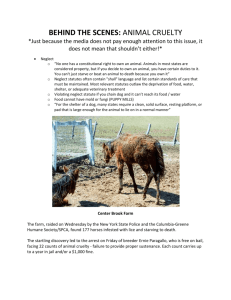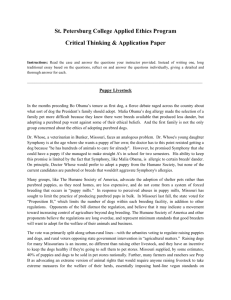vtpuppymillfactsheet..
advertisement

Fact Sheet SUPPORT H. 340 The Puppy Mill Cruelty Prevention Act HELP CRACK DOWN ON PUPPY MILLS IN VERMONT What is a puppy mill? A puppy mill is a mass breeding facility in which the parent dogs (referred to as ‘breeders’) are forced to churn out litter after litter of puppies that will be sold in pets shops, over the Internet and directly to the public. Because the bottom line, not the health or well-being of the dogs or the breed, is the issue dogs are often warehoused in tiny cages that are stacked in barns and sheds. Most of the breeding dogs receive little to no veterinary care and never get out of their cages for exercise or socialization. Unlike the puppies, who will have the chance of becoming part of a family, it is the parent dogs that suffer most in puppy mills; never knowing the pleasure of a treat, a toy, a bed, or the feeling of grass under their feet. Are consumers affected by puppy mills? The unwitting consumer who buys a puppy from a pet store or over the Internet may be unaware that they are supporting an industry that thrives on cruelty. But they may also be acquiring a tragic and expensive problem. Puppy mill puppies often arrive with a host of behavioral, genetic, and physical problems, from congenital heart defects and fear-biting, to parvovirus and respiratory infections. The consumer’s ability to pursue legal recourse against the breeder may be limited, leaving the consumer with nothing but vet bills and the heartbreak of watching their puppy suffer. Puppy Mills are a Problem in Vermont. Puppy mills come in all sizes. While Vermont is not typically home to operations housing hundreds of animals in outdoor cages, the suffering that dogs endure in “mini-mills” operating out of basements, sheds or garages is no less. Puppy mills thrive by remaining out of the public eye and therefore without public scrutiny for how they treat the dogs kept for breeding. Because buyers are often directed to “meet” puppies off premises from where they’re bred, consumers unwittingly support this cruel industry by purchasing these animals. What will the bill do? The bill would require that any breeder with custody of more than 10 intact female dogs for the purpose of breeding and selling their offspring provide their dogs with sufficient food and clean water, necessary veterinary care, sufficient housing and space, regular exercise, and adequate rest between breeding cycles. Breeders would also not be allowed to have custody of more than 50 intact dogs for the purpose of breeding and selling any offspring, which would prevent large scale facilities from moving into Vermont in the future. Puppy mills are a disgrace. This bill will provide dogs in breeding operations the best hope for a better life. Small or hobby breeders who have 10 or fewer female breeding dogs will not be affected by the amendment. No pet stores or other retail outlets selling dogs or cats will be affected. In addition, this amendment has no effect on anyone’s right to own a dog or cat, or any number of dogs or cats. It simply ensures the humane care and treatment of dogs and cats in the custody of large-scale breeders. Fact Sheet Aren’t there existing laws to stop irresponsible breeding? Although Vermont has anti-cruelty laws intended to address neglect and mistreatment of animals, most large-scale breeding facilities continue to operate in ways that mock these laws. Due to a loophole in the federal Animal Welfare Act, large commercial breeders who sell puppies directly to pet owners, including those who sell over the Internet, are exempt from any federal oversight. And even those that are subject to federal oversight are not providing the minimal standards of care required under the Act. The USDA’s Office of Inspector General (OIG) recently released a report confirming that USDA inspectors regularly ignore horrific suffering at commercial dog breeding facilities and allow the facilities to continue to operate, unimpeded, despite repeated violations of the Act. Why set a limit of 50 breeding dogs, and does this violate constitutional rights? Large-scale commercial facilities that mass-produce puppies contribute to the tragedy of pet overpopulation, risk the proliferation of giant-sized puppy mills and are at risk of becoming overcrowded and out of control. A cap of the number of sexually intact adult dogs provides standards and laws that animal control and law enforcement can effectively enforce. Assuming 40 of the maximum of 50 dogs are females, and with an average litter size of five puppies (a conservative estimate), breeders will be able to sell as many as 200 puppies a year if each female is bred only once a year, or 400 puppies a year if the females are bred twice a year. Minimum care standards alone will not shut down or deter the worst puppy mills. In other states that require minimum care standards but do not set a limit, unhealthy, inhumane puppy mills continue to flourish. Setting a 50dog limit is aimed at stemming the growth of large-scale factory-style dog breeding operations that are at a greater risk of becoming overcrowded and out of control. There is no constitutional right to breed an unlimited number of dogs, and the measure does not take anyone’s property. It just places a sensible upper limit on the use of dogs for breeding at any one operation. Unrestricted dog breeding is not a fundamental right, and regulation of animals is within the state’s police power. The argument that the state is not permitted to impose a cap is like saying the state cannot limit the number of children in any one day care facility, the number of smokestacks at a factory, or the number of people in a dance hall at any one time. And this doesn’t ban ownership of more than 50 dogs, it just puts a cap on the number of animals that can be bred at any one operation. Aren’t the AKC’s care standards sufficient? Some breeders may follow the AKC’s standards, but many don’t. Compliance with those standards is completely voluntary. There are dozens of dog registries in this country besides AKC, so many purebred dogs are not registered with AKC, nor does AKC inspect every breeder who registers dogs with them. AKC does not have the ability to enforce any laws. If a breeder is found to be out of control, the only penalty available to the AKC is suspension of that breeder’s ability to register dogs with AKC. There is nothing stopping this breeder from registering dogs with other breed clubs after an AKC suspension Large-scale puppy mill operators care about one thing: the bottom line. Minimum care standards must be written into law in order to guarantee that dogs get the care they need and deserve and to level the playing field with more humane breeders. Fact Sheet Is there public demand for limits on dog breeding? Public scrutiny of dog-breeding operations has increased as puppy mills have grown in size and seriousness of abuse. Because they nearly always involve horrendous images of badly neglected dogs and puppies, raids of puppy mills typically attract widespread media attention and public outrage. Recent national television coverage about the horrors of puppy mills has provided even more heightened awareness of the problem. The Humane Society of the United States has received more requests from its members for legislative action against puppy mills than any other animal issue. Is The HSUS Against all Dog Breeding? The HSUS is not opposed to responsible dog breeding, but we do take an unapologetic stand against puppy mills and irresponsible breeders. Although we always recommend a shelter as the very best place to get a pet, The HSUS also publishes several guides for the public to help them find and identify a good dog breeder, including our Puppy Buyer's Guide and our Good Breeder Checklist. These are available for free on our website. A reputable breeder believes that dogs who are used for breeding should be kept as part of the family; believes that housing dogs in cages 24 hours a day for years on end is an inhumane way to treat an animal who thrives on companionship; and supports excellence in care and attention for breeding dogs and their puppies Please support H. 340, The Puppy Mill Cruelty Prevention Act to help crack down on puppy mills in Vermont! For additional questions, please contact Joanne Bourbeau at 802-368-2790




